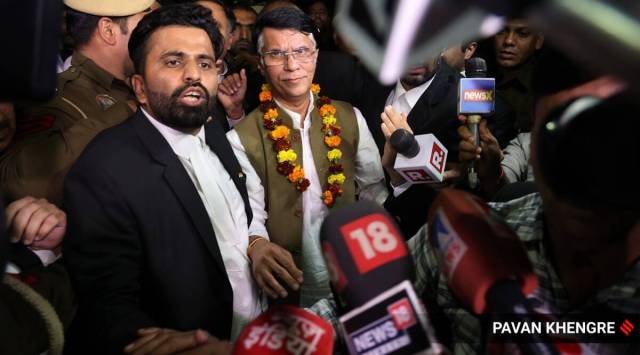
On Thursday, the Assam police suddenly swooped into the Delhi airport to arrest my former colleague Pawan Khera, chief spokesperson of the Congress party. It was a grotesque overreaction. Nothing justified the sanctimonious outrage of the ruling Bhartiya Janata Party at Khera’s sardonic dig at the Prime Minister Narendra Modi’s alleged chummy relationship with the controversial businessman, Gautam Adani.
Politics is about subtle and overt messaging; the several FIR’s filed against Khera, a who has a loquacious answer to all of the BJP barbs, was unambiguously telling everyone else out there in India’s hyperventilating ecosystem: We can come after you. Straight and simple. The fangs of an authoritarian bully were being showboated. Take it or lump it.
Khera had in a press conference held earlier in Mumbai wickedly done a wordplay with Modi’s father’s name, later claiming to inadvertently call him Gautam Das instead of his real name Damodar Das. Given the bizarre histrionics, we see in the consecrated Parliament every day from elected members of the House, wherein even Modi insinuates mortifyingly at the Nehru surname as if it is an albatross around the neck of the Gandhi family, Khera was only playing by the standard playlist. Should Khera have, however, adhered to the substandard conversations that define our public discourse today? Probably not. It was, in retrospect, completely unwarranted. But then it is not easy being a national spokesperson of a party. You are daily gingerly navigating a minefield. You are expected to deliver an annihilated opponent, bludgeoned to bits. In the nightly blood-fest ritual that happens on prime-time TV, there can be only one man standing when the curtains fall. The pressure is enormous. It was there earlier too, but it has become nauseatingly toxic.
Long before I became an official voice of the grand old party in 2013, one had been articulating the Congress position ever since Anna Hazare and Arvind Kejriwal were daily slaughtering an unusually tepid UPA government in 2011. The regulars representing the Congress were Abhishek Manu Singhvi, Manish Tewari, Jayanti Natarajan and the humble undersigned. Occasionally, Renuka Chowdhury and Rajiv Shukla joined in. The BJP fielded the veteran Ravi Shankar Prasad, Nirmala Sitharaman, Prakash Javadekar and Piyush Goyal. When it came to serious heavy-lifting, Arun Jaitley made his commanding presence felt. Trust me, there was no love lost, and it was often acrid, but we unwittingly, subconsciously knew where to draw the line. Javadekar was always humble and although Prasad found me an exasperating gatecrasher into the elite club, he never got nasty.
Things changed dramatically after the monstrous emergence of social media, particularly Twitter, in the post-2014 phase. 2014 marks the beginning of a polarised India, which appears to be an ongoing project still in full throttle. A new trend emerged. The moment a programme concluded, spokespersons would rush to their social media accounts to seek validation from their equally trenchant echo chambers. The applause and appreciation got louder the more vitriol, venom, and vituperation there was, I assume, for all the bruised gladiators in the circus. The motivation to indulge in exaggerated histrionics and name-calling backed by furiously animated expressions had suddenly become de rigueur. Spokespersons had to become actors. News became politainment, like a Netflix spectacle pregnant with sound bites, whataboutery, fake news, and dialogue-baazi. Bellicosity becomes a badge of honour.
I often encounter this gentleman, who comes prepared with a C-grade Bollywood script and mouths them with professional insouciance. I believe he is a superhit with a cult following in his charmed constituency. But honestly, we do a great disservice to non-aligned television viewers. Spokespersons are also given an instant assessment by their party superiors or colleagues following a political slugfest; the more caustic or ill-tempered, the better. The decline in standards is startling. Pawan, in my opinion, is a victim of the ballooning age of competitive muckraking. It is the new playground. The gloves are off, détente is a distant dream. While some of my former colleagues have sometimes trespassed the red lines that define a civilised dialogue, I need to regretfully state that the BJP is more guilty of being deliberately coarse and crude, thereby creating a corrosive environment of mutual recriminations. Recently, the External Affairs Minister was gratuitously indulging in writing a Bollywood fantasy himself.
In calling the BBC documentary on the 2002 riots, Hindenburg Research report on the Adani Group and the multi-billionaire 92-year investor George Soros’ comment on the same as part of a foreign conspiracy (stealthily backed by the Congress, of course, who else?) to malign India, S Jaishankar sounded outrageous, outlandish and altogether obtuse. This was not just brazen mendacity, it was a collective gaslighting of an unsuspecting, trusting nation.
For the Congress, the lesson is not to fall for the BJP’s tit for tat culture. At Raipur, they need to remember Mahatma Gandhi’s an eye for an eye makes the world goes blind admonishment. As for the BJP, their tallest leader got the name of the Father of the Nation wrong. A slip of the tongue is not unusual, perhaps.
The writer is a former spokesperson of the Congress party